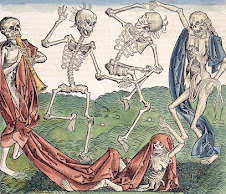Thursday, March 13, 2008
Although Ganelon was eventually hanged, he was neither found guilty by the “court” nor was he really on trial for leading Roland to his death. In fact he freely admits to plotting against Roland; however, he does attempt to claim innocence by declaring he did not betray the king and, by extension, the kingdom. This shows that feuds or killing others for revenge is not a crime and only family members are expected to take action, which embodies the concept of taking the law into your own hands. Moreover, the king makes it clear he wants Ganelon to be hanged, but, because he was found innocent by vote, this incident shows that king or rulers have limited power in the justice system. While the king’s wish fails to persuade the majority, Thierry chooses to take the king’s side and votes for Ganelon’s haning. More importantly, Thierry’s dissension seems to be enough to do so, which is demonstrated by Pinabel challenging Thierry to combat to prove Ganelon’s innocence. This turn of events shows that, while crimes are judged by a council, the verdict can always be contested and force, not reason, can be used. Because force is the deciding factor, medieval justice is shown to focus around strength of arms, and not reason. Lastly, Ganelon's trial as a whole shows that medieval justice is less about laws and justice and more about practicality, because the stronger person, the survivor, will be more useful in battle than the weaker person who was defeated. This claim is further strengthened by the council declaring Ganelon innocent due to their belief no one would be willing to fight Pinnabel to prove Ganelon guilty, which shows they did not wish to waste time with a pointless verdict.
Subscribe to:
Post Comments (Atom)

No comments:
Post a Comment